

On Flipboard. Educational Leadership:Getting Personalization Right:One-Size-Doesn't-Fit-All Homework. Q&A: Education Technology Expert On Teaching the Next Generation of Teachers. As an instructor in the University of Wisconsin-Platteville’s School of Education, Jessica Brogley is teaching the next generation of teachers — those who will carry forward the continuous transformation of pedagogy.
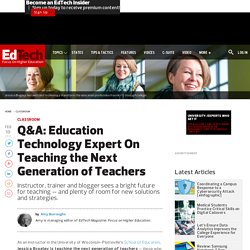
Brogley is also the assessment, technology and literacy support specialist for Platteville Public Schools; a Google for Education Certified Trainer and Innovative Educator; and a blogger, speaker and trainer. She spoke with EdTech Managing Editor Amy Burroughs about the ways classroom technology is expanding opportunities to teach and learn. Professional Learning Networks (PLNS) How to Manage the 4 Types of Teachers You Meet in Professional Development. In my heart, I will always be a middle school English Language Arts teacher.
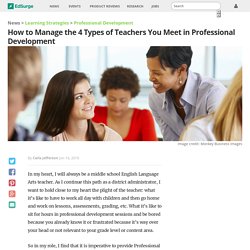
As I continue this path as a district administrator, I want to hold close to my heart the plight of the teacher: what it’s like to have to work all day with children and then go home and work on lessons, assessments, grading, etc. Your PLN: Fuel for an Empty Tank. This last week I found myself flat out-of-breath.
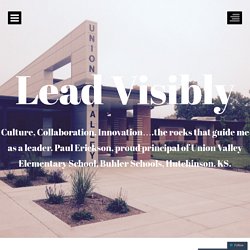
No, I didn’t run a marathon, take on a Spartan Challenge, or even ride my bike to work. I just found myself exhausted from the stress that comes with spring when you teach or lead a school. While I’m huffing, puffing, and in need of some rest, there will be no break for me. There is just too much important work, and I know that our school family at Union Valley Elementary is counting on me. Astro Teller: The unexpected benefit of celebrating failure. Notable Notes: Considering the Literacy Narrative - Metawriting. Constructionism (learning theory)
Seymour Papert Seymour Papert defined constructionism in a proposal to the National Science Foundation entitled Constructionism: A New Opportunity for Elementary Science Education as follows: "The word constructionism is a mnemonic for two aspects of the theory of science education underlying this project.
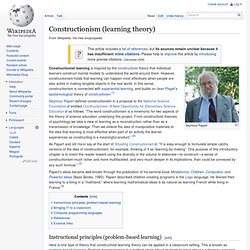
From constructivist theories of psychology we take a view of learning as a reconstruction rather than as a transmission of knowledge. Then we extend the idea of manipulative materials to the idea that learning is most effective when part of an activity the learner experiences as constructing is a meaningful product. ".[2] What if We Really Cared About Teacher Preparation? Abstract Efforts to reform teacher education in recent years have focused on demands for higher quality candidates and indicators of rigorous preparation without careful consideration of the total policy environment in which such preparation must take place.
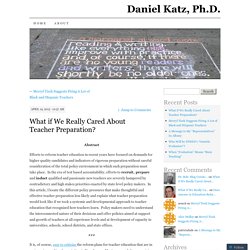
In the era of test based accountability, efforts to recruit, prepare and induct qualified and passionate new teachers are severely hampered by contradictory and high stakes priorities enacted by state level policy makers. In this article, I locate the different policy pressures that make thoughtful and effective teacher preparation less likely and explain what teacher preparation would look like if we took a systemic and developmental approach to teacher education that recognized how teachers learn. It is, of course, easy to criticize the reform plans for teacher education that are in various stages of implementation in New Jersey.
This Year At The 'Davos of Education.' Plus, The 16 Most Critical 21st Century Skills. Imagine This: Creative Play and 21st-Century Learning. I bought my six-year-old daughter a Black & Decker LI3100 Compact Lithium-Ion Rechargeable Screwdriver.
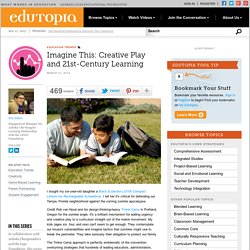
I tell her it's critical for defending our Tampa, Florida neighborhood against the coming zombie apocalypse. Credit Rob van Nood and his design-thinking-heavy Tinker Camp in Portland, Oregon for the zombie angle. What Is A Personal Learning Network? What Is A Personal Learning Network?
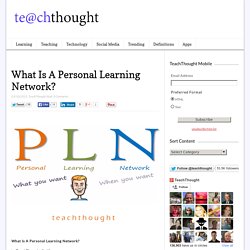
By TeachThought Staff What is a personal learning network, or rather a Personal Learning Network? How about a Professional Learning Network? 8 Steps To Teacher-Led, Digital PD. 8 Steps To Teacher-Led, Digital PD by TeachThought Staff Professional development for teachers is a beautiful thing.
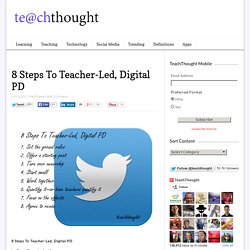
While many professionals work either in isolation or total stagnation, educators are constantly given new tools to become better at their craft. Bringing Professional Development Into the 21st Century. 5 Big Ways Education Will Change By 2020. We asked the world’s most innovative companies in education to school us on the future of the classroom, with predictions for the next five years.
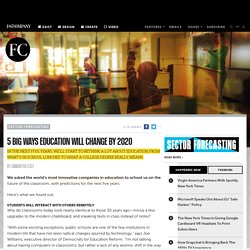
Here's what we found out: Students Will Interact With Others Remotely Why do classrooms today look nearly identical to those 30 years ago—minus a few upgrades to the modern chalkboard, and sneaking texts in class instead of notes? "With some exciting exceptions, public schools are one of the few institutions in modern life that have not seen radical changes spurred by technology," says Joe Williams, executive director of Democrats for Education Reform. "I’m not talking about having computers in classrooms, but rather a lack of any seismic shift in the way things are done because technology is making the work easier or more efficient. " Future Ready Schools: A Toolkit for Empowering Educators through PD. Future Ready Schools: A Toolkit for Empowering Educators through Professional Learning.
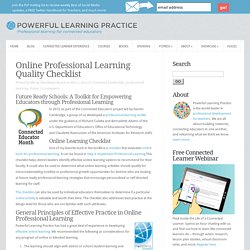
Building Productive and Collaborative Relationships at the Speed of Trust. Key Takeaways To facilitate IT project success in the challenging higher education environment, trust and collaboration among IT staffers and various campus groups are essential. To improve trust and collaboration, the IT staff at Cornell University's Samuel Curtis Johnson Graduate School of Management consciously set out to create highly productive relationships with the school's departments, faculty, and students. The team's experiences and lessons learned can guide both brief and long-term collaborations, as well as daily interactions among IT staffers and customers across an institution. Collaboration, design thinking, and innovation go hand-in-hand. Using Twitter as a PBL Professional Development Tool.
Professional Development 2. Supporting Teacher PD with New Technologies On a stormy day in February I sat at my desk in Edmonton, making last-minute touches to an after-school workshop for beginning teachers. Later, I popped into the meeting room, met the session host, who was from Calgary, and set up my materials. As participants entered the room, the host and I chatted with them about their teaching assignments. We were excited to discover that they represented districts from across Alberta. The session, which focused on differentiated instruction, went smoothly. Interestingly, everyone participated without leaving the warmth of their own schools. AlbertaPD The AlbertaPD project supports new teachers as they expand their knowledge about differentiated instruction and assessment for diverse learners. The Connected Educator Movement Is Failing, And We’re All To Blame.
Sometimes it’s good to get a dose of reality. Last April I stumbled upon an EdSurge post entitled, “Twitter Exec Reports that Educators Dominate the Twitter-sphere.” I kind of sat on that news for a while, waiting for educators to uproariously respond to it, either positively or negatively. That… never really happened. The National #ConnectEd movement, at least as it’s been promoted by Ed.gov was in full swing for over a year, however, the connected educator movement began (roughly) back in 2007 with just a handful educators tweeting and sharing. Educational Technology Professional Development. Online-educator / Online Professional Development (OLPD) References. Presentation, Interview, Anklam, P. 2007. How Teachers Are Learning: Professional Development Remix. There are two components to the EdSurge PD framework: professional learning stages and tool classification.
On the EdSurge site, each of the 28 tools listed here have been analyzed according to this framework. You can read the analysis of each of these tools by searching the EdSurge site for the individual product page for each of those products. Stage One: Engage Teachers gain tremendous value from interacting with peers and colleagues--sharing challenges, successes, what works, and what doesn’t. Community support is a big part of the way teachers process and apply what they learn.